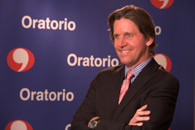 Ever the master communicator, Maggie Smith's Lady Violet Crawley understands the importance of staying on message. Remember how she strong-armed poor Dr. Clarkson to stick to the story that Sybil had only the tiniest chance of survivial after preclampsia set in? She did this because Sybil's mother Lady Grantham still thought Sybil might have survived if she had been taken to the hospital for a C-section, which Lord Grantham had opposed on another doctor's recommendation.
Ever the master communicator, Maggie Smith's Lady Violet Crawley understands the importance of staying on message. Remember how she strong-armed poor Dr. Clarkson to stick to the story that Sybil had only the tiniest chance of survivial after preclampsia set in? She did this because Sybil's mother Lady Grantham still thought Sybil might have survived if she had been taken to the hospital for a C-section, which Lord Grantham had opposed on another doctor's recommendation.
Lady Violet tells Dr. Clarkson: "You've created a division between my son and his wife when the only way they can conceivably bear their grief is if they face it together." In other words, don't let your words foment any doubt in Lady Grantham's mind.
In a subsequent scene, Lord and Lady Grantham question Dr. Clarkson at length but he doesn't stray from the main theme: that Sybil would have most likely died even if she had delivered the baby by Cesarean as he had recommended.
From Episode 5:
Dr. Clarkson:
On that awful night I'm afraid I'm afraid I may have given you the impression my recommended course of treatment offered a real chance of Lady Sybil's survival. The truth, and I've done a great deal of research since as you can imagine, is that the chance was a small one, a tiny one really.
Lady Grantham:
But ... there was a chance.
(Long look between Dr. Clarkson and Lady Violet.)
Dr. Clarkson:
An infinitesimal one. The discomfort and the terror would have been all too certain.
Lord Grantham:
So you think Tapsell (the other doctor) was right?
Dr. Clarkson:
Oh, I cannot go that far. Sir Tapsell ignored all the evidence in an unhelpful, and if I may say, an arrogant manner.
Lord Grantham:
But ... Sybil was going to die.
Dr. Clarkson:
When everything is weighted in the balance, I believe Lady Sybil was going to die.
So: Dr. Clarkson maintains his proper English stiff upper lip and stays on message, and Lord and Lady Grantham go back to sleeping in the same bed again. It worked in a 1920's Yorkshire estate, and it still works everywhere else in 2013.





